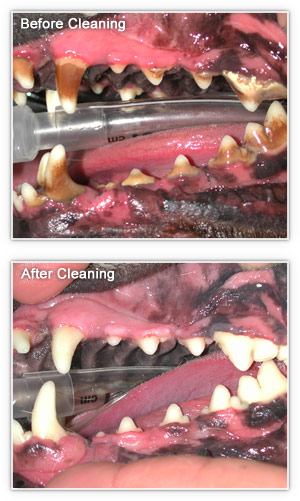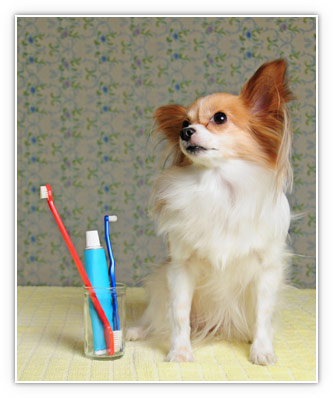 The Importance of Dental Care for Your Union Pet
The Importance of Dental Care for Your Union Pet
Dental care is an important part of your pet’s wellness program. The Union veterinary dentistry team at Eastland Veterinary Hospital strongly believes that proper cat/dog dental care not only increases your pet’s health, vitality, and well-being, and adds additional years to his or her life, it also helps minimize the lifetime cost of care by preventing dental and systemic disease.
If left untreated, dental disease can not only be painful and inhibit proper nutrition, but it can also lead to serious systemic issues that may threaten your pet’s health before symptoms are noticeable. For example, oral bacteria that enter the bloodstream can damage your pet’s kidneys, heart or liver. It is estimated that more than 80 percent of dogs and 70 percent of cats develop tooth and gum disease by the age of three years.
Your Pet’s Dental Cleaning
At Eastland Veterinary Hospital, we believe that the centerpiece of good pet dental care is a complete oral exam followed by a thorough cleaning. Dental cleanings include ultrasonic scaling followed by polishing and an antiseptic mouth rinse, the combination of which is designed to remove plaque and slow its buildup.
Your pet’s dental prophylaxis includes:
- Oral examination
- Diagnosis and treatment of periodontal disease
- Pre-Anesthetic Blood work to check up liver and kidney status
- Catheter Placement and Intravenous Fluids
- General Anesthesia Protocols
- Supra and Subgingival Scaling, Polishing, Irrigation, Fluoride Application
- Tooth extractions when absolutely necessary
- Antibiotics and Pain Medication before and after dental cleaning and tooth extraction as needed
Should we find any issues, such as evidence of gum or tooth erosion, gingivitis, or excessive plaque buildup, we will discuss this with you and offer treatment options for your pet. We are experienced dental practitioners and are capable of offering a number of dental procedures and oral surgeries. For more complicated or severe cases, we may refer you to a board certified dental specialist.
The veterinary team at Eastland Veterinary Hospital is dedicated to educating you about the importance of your pet’s dental health. The home care products we offer are carefully researched and selected for optimum health benefits. Our dental technicians are well educated and highly trained in dentistry and we take great pride in the services we provide.
Home Pet Dental Care
Prevention is the best protection from periodontal disease.
Preventing periodontal disease by keeping your pet’s teeth and gums healthy isn’t just a job for your veterinarian; it’s your job too. While nothing can take the place of regular visits to Eastland Veterinary Hospital for checkups and cleanings, on-going follow-up oral care at home is just as important in controlling plaque and tartar formation.
The goal of home pet dental care is to remove plaque before it mineralizes into calculus (tartar), a process that occurs within days of a teeth cleaning. Brushing your pet’s teeth is the single most important procedure you can do to maintain good oral health. If performed regularly, brushing dramatically decreases the incidence of gingivitis and increases the interval between teeth cleaning appointments.
 Brushing your pet’s teeth is best started at a young age, before the adult teeth erupt. The younger the animal is, the more likely he or she is to accept it. Regular brushing not only keeps your pet’s teeth clean and healthy, it also enhances the bond between you and your pet. If you are unsure of how to brush your pet’s teeth, please ask a staff member at Eastland Veterinary Hospital for instructions. We are happy to instruct and/or demonstrate to you the best and easiest method. Also, please remember to always use tooth paste specifically made for pets, not for people.
Brushing your pet’s teeth is best started at a young age, before the adult teeth erupt. The younger the animal is, the more likely he or she is to accept it. Regular brushing not only keeps your pet’s teeth clean and healthy, it also enhances the bond between you and your pet. If you are unsure of how to brush your pet’s teeth, please ask a staff member at Eastland Veterinary Hospital for instructions. We are happy to instruct and/or demonstrate to you the best and easiest method. Also, please remember to always use tooth paste specifically made for pets, not for people.
If brushing your pet’s teeth is not possible, ask a staff member to help you select the most effective dental products for your pet.
You should also be able to recognize the signs of poor oral health. If you notice any of the following, you should contact us and make a dental appointment for your pet:
- Persistent bad breath, one of the first signs of dental disease
- Tartar or plaque buildup (ask your veterinarian how to identify them)
- A yellowish-brown crust of plaque on the teeth near the gum line
- Red and swollen gums
- Pain or bleeding when your pet eats or when the mouth or gums are touched
- Pawing at the mouth
- Decreased appetite or difficulty eating
- Loose or missing teeth
If you have any questions or would like more information about the dental services we offer for your pet, please call our Union, New Jersey veterinary hospital at (908) 688-1640 or contact us online.


